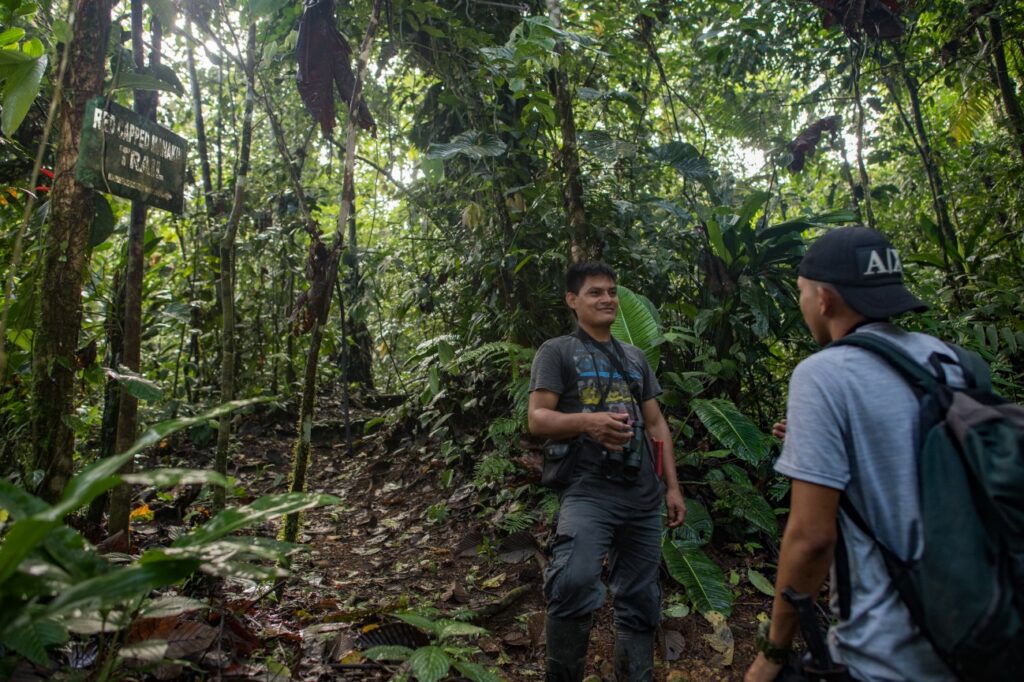The benefits from our ‘Saving Ecuador’s Chocó Forest’ appeal will extend to people as well as wildlife. As we preview today, our partner Fundación Jocotoco’s plan to protect the last 2% of these rainforests will safeguard the culture and livelihood of the Chachi communities, hard hit by decades of logging.
The Chachi people who left the Amazon hundreds of years ago to resettle in the Ecuadorian Chocó could have never predicted the extreme transformation their new home would experience.
Crossing over to the western slopes of the Andes, the communities travelling across steep mountain valleys found tropical forests that stretched all over Ecuador’s west. Few of those making the arduous journey would have guessed that the rainforest would eventually shrink to 2% of its original size, a devastation brought about by just over eight decades of logging.
Enabling the Chachi people to reconnect with their forest home is one of the priorities of Fundación Jocotoco (FJ), the WLT partner currently working to save the Chocó. Their project to buy and protect 57,000 acres (23,067 ha) of these forests in Ecuador – with WLT’s appeal supporting at least 1,668 acres (675 ha) – will seek to also benefit the indigenous communities of Esmeraldas Province, a culture under siege from intensive logging.
Backed by WLT’s new appeal, the expansion of the Canandé Reserve (pictured above) would help create a vast natural buffer around existing reserves owned by the Chachi. Image credit: ©Scott Trageser
As FJ CEO Martin Schaefer tells us, centuries of isolation allowed the Chachi to retain a distinct identity until fairly recently; a way of life inextricably linked to the forest. But in a case that echoes that of many indigenous communities worldwide, such a bond is weakening as the roads built for logging projects bring more people into the area, and tough economic choices for the Chachi.
“The same logging-based economy that has razed so much of the Chocó forest, pushing the ecosystem and its wildlife to the brink of an extinction cliff, also affects the Chachi, Because of a lack of economic choices, these people are often forced to sell forest rights to logging companies – they lose the ecosystem that protects their water, as well as their culture and identity.” – Martin Schaefer
As Martin explains, FJ’s project will try to change that. With support from WLT donors, the #SaveTheChocó campaign will seek to replace the current model of industrial-scale logging with community-owned forms of sustainable land use. Our partner will do this by applying a model that the Washu Chocolate initiative has already had success with elsewhere in the Chocó.
“What Washu do is they guarantee small holders a high premium for the cacao they grow and in return, the landowners agree to preserving 52% of the properties as forest,” Martin explains. “We intend to replicate this model with cacao and small-scale timber extraction, and the plan is to establish processing plants so that more of the economic benefits and the skilled labour goes to local people.” – Martin Schaefer
Enabling the Chachi to continue their role as forest stewards and rangers
From Jaguar to the critically threatened Brown-headed spider monkey, the wildlife of Ecuador’s Chocó needs vast, protected swathes of forest to thrive; the Chachi people are no different.
As Martin notes, life in this Indigenous community has long revolved around two pillars: sustainable harvesting of large expanses of rainforest and historically low population density. The surge of commercial logging over the past decades has thrown such a way of life into the air: at present, communities simply lack the land to sustain themselves based on their ancestral cultural practices.
For years, FJ has helped the Chachi to reforest their watersheds with commercially valuable trees. The new forest properties they can purchase with your support will bring extra protection to the Chachi-owned reserve, by adding a vast buffer zone all around it.
Chachi-born FJ ranger José Añapa has focused since January 2020 on the monitoring of primates and tells us that one of his favourite past-times is to learn bird species names in English. Image credit: ©Fundación Jocotoco.
In addition, the new reserves will count Chachi people amongst their rangers. Raised in the communities of Chontaduro, José Añapa has spent six years protecting wildlife at the Canandé Reserve and will continue patrolling the trails. José, who since January has focused on the monitoring of primates, tells us: “If we don’t protect the Chocó now, there might not be a future for the trees and animals.”
With José as the latest example, the link of indigenous people with the Chocó goes back a long way. As FJ’s CEO Martin notes, rangers patrolling the reserves often find pottery fragments in the soil; evidence of a long shared history. If our partner succeeds and secures the largest remaining tract of these forests, a future is possible where the Chachi don’t have to choose between their culture and their livelihoods.
“These are and will continue to be hard times for indigenous communities and there is a need to improve livelihoods through sustainable products that don’t cost the planet, Our plan will make the Chachi the stewards of their own resources while safeguarding the forest, creating an economic model that works and doesn’t erase the cultural identity of these people.” – Martin Schaefer

